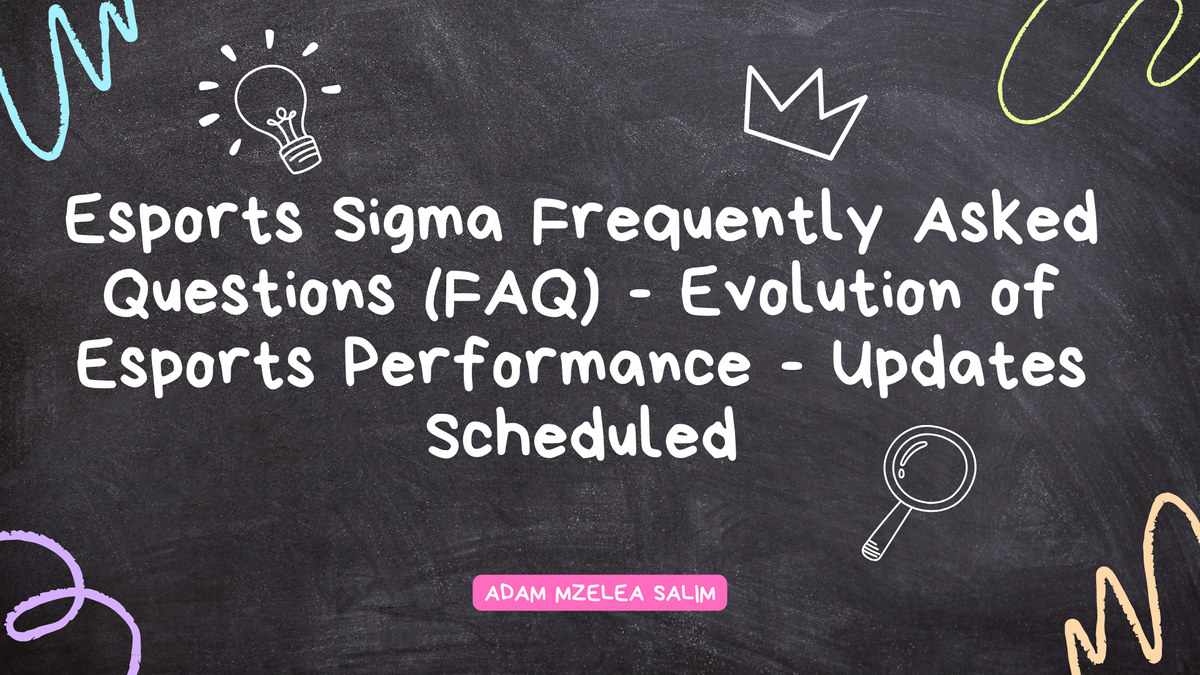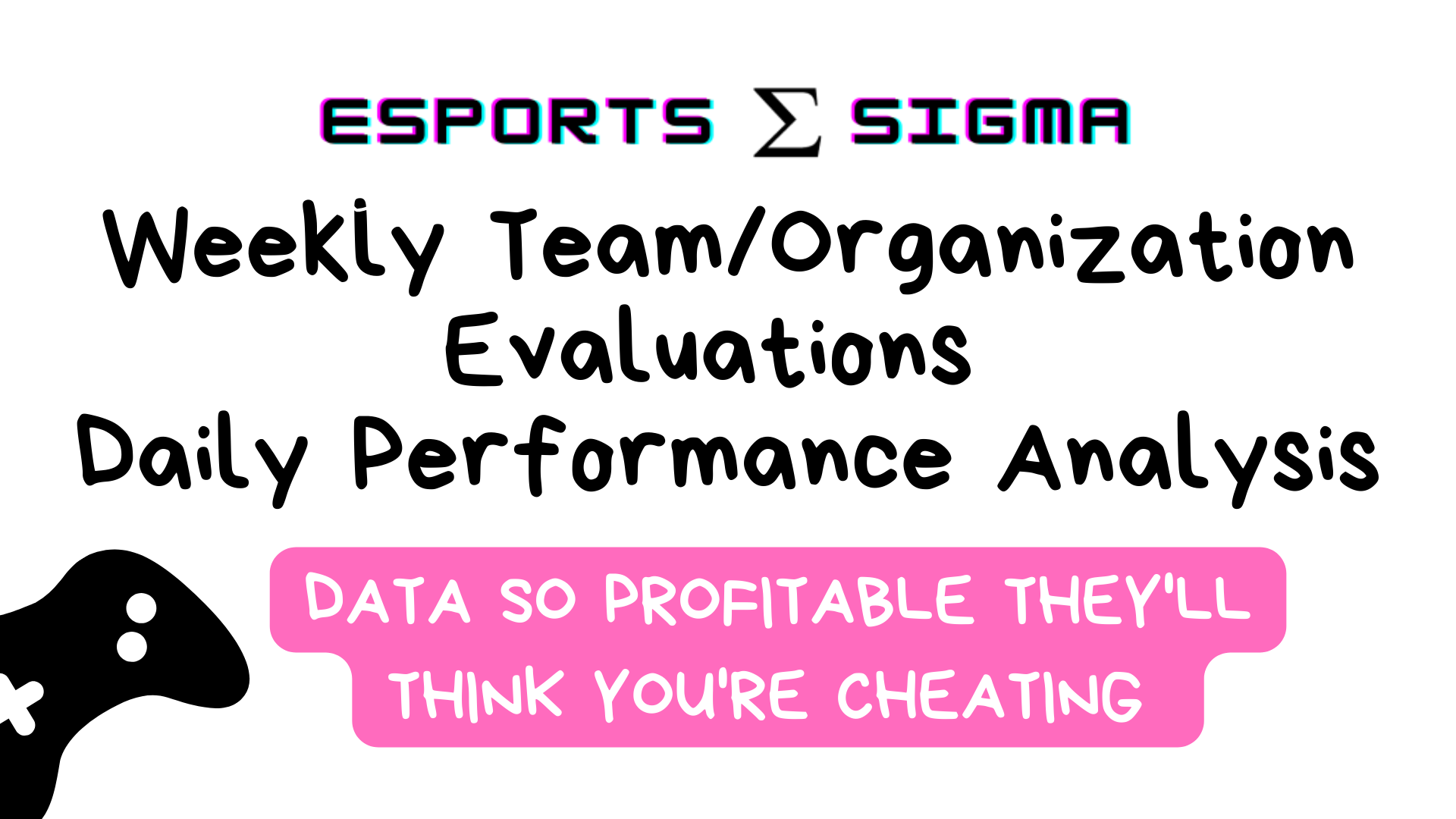Σ Esports Sigma Frequently Asked Questions (FAQ) - Evolution of Esports Performance - Updates Scheduled

Namaste 🙏 esports data analysts! After almost a 76 years (esports started in 1947, source The Book of Esports), many of you are *new* to Esports Sigma. Why is professional cyber athletics is an almost century long “gatekept” experience reserved by elites for the top 1%? Read on because this FAQ will help you dodge asking low level Google search questions.
Super Efficient Background:

Tyrone Butler, CEMBB,CLSSMBB,TPS,ITIL,ITSM introduced me to Lean Six Sigma on July 8th, 2020. By Wednesday March 23, 2023, I've mentored employees from Netflix, Activision Blizzard, Riot Games, top esports teams, organizations, cyber athletes, Chairmen, CEOs & raised over $10M+ for esports startup companies & became officially Certified in Esports Lean Six Sigma White Belt standards.
This newsletter is for you now that you know who I am along with my mentor Tyrone & our work history within the video game/esports industry.
Here are some frequently asked questions (FAQs) about the evolution of esports performance:
Q: What is esports performance?
A: Esports performance is the ability of an individual or team to achieve success in esports competitions. It is influenced by a variety of factors, including physical skills, cognitive skills, mental skills, and teamwork.
Q: How has esports performance evolved over time?
A: Esports performance has evolved significantly over time. In the early days of esports, cyber athletes were primarily focused on mastering the mechanics of their games. However, as esports has become more competitive, cyber athletes have begun to focus on other aspects of their performance, such as developing their cognitive skills, mental skills, and teamwork.
Q: What are some of the key factors that contribute to esports performance today?
A: Some of the key factors that contribute to esports performance today include:
- Physical skills: Esports cyber athletes need to have good hand-eye coordination, reaction time, and endurance.
- Cognitive skills: Esports cyber athletes need to be able to think strategically, make quick decisions, and solve problems under pressure.
- Mental skills: Esports cyber athletes need to be able to stay focused, manage their emotions, and perform under pressure.
- Teamwork: Esports teams need to be able to communicate effectively, coordinate their actions, and work together to achieve a common goal.
Q: How is Lean Six Sigma being used to improve esports performance?
A: Lean Six Sigma is a data-driven methodology for improving processes by eliminating waste and variation. It is being used by esports teams and cyber athletes to improve their performance in a variety of ways, such as:
- Identifying and addressing performance bottlenecks
- Developing and implementing more effective training programs
- Improving team communication and coordination
- Reducing the risk of errors and mistakes
Q: What are some examples of how esports teams and cyber athletes have used Lean Six Sigma to improve their performance?
A: Here are a few examples of how esports teams and cyber athletes have used Lean Six Sigma to improve their performance:
- One esports team used Lean Six Sigma to identify and address bottlenecks in their training process. This resulted in a significant improvement in their overall performance.
- Another esports team used Lean Six Sigma to develop a more effective training program for their cyber athletes. This program helped the cyber athletes to improve their cognitive skills, mental skills, and teamwork.
- An esports cyber athlete used Lean Six Sigma to identify and reduce the number of errors that he was making in competition. This resulted in a significant improvement in his overall performance and ranking.
Q: What are the benefits of using Lean Six Sigma to improve esports performance?
A: There are many benefits to using Lean Six Sigma to improve esports performance, including:
- Improved performance: Lean Six Sigma can help you to identify and address the root causes of performance issues. This can lead to significant improvements in performance metrics such as KDA, win rate, and placement.
- Reduced costs: Lean Six Sigma can help you to reduce waste and inefficiency in your esports operations. This can lead to significant cost savings, which can be reinvested in other areas of your team, such as training and equipment.
- Increased competitive advantage: Lean Six Sigma can help you to develop a competitive advantage over your opponents by enabling you to identify and implement performance improvements faster than they can.
Q: What is the difference between an error and a mistake in esports performance?
A: An error is a deviation from the intended or expected outcome that is caused by a lack of skill or knowledge. A mistake is a deviation from the intended or expected outcome that is caused by a lack of attention or focus.
Q: Can you give me some examples of errors and mistakes in esports performance?
A: Here are some examples of errors in esports performance:
- Using the wrong ability at the wrong time
- Positioning yourself incorrectly
- Not being aware of your surroundings
- Not understanding the game mechanics
Here are some examples of mistakes in esports performance:
- Misclicking
- Overextending
- Failing to communicate with your team
- Getting caught off guard
Q: How can I avoid errors and mistakes in esports performance?
Here are some tips for avoiding errors and mistakes in esports performance:
- Practice regularly and focus on developing your skills and knowledge.
- Be aware of your surroundings and pay attention to the game mechanics.
- Communicate effectively with your team.
- Stay calm and focused under pressure.

Disclaimer: None of this is to be deemed legal or financial advice of any kind. These are **OPINIONS** written by a certified Esports Lean Six Sigma White Belt data analyst & esports business mentor who leveled up to software as a service & blockchain technology. I'm an advisor for video game/esports business owners & executives 2019-2024E.

